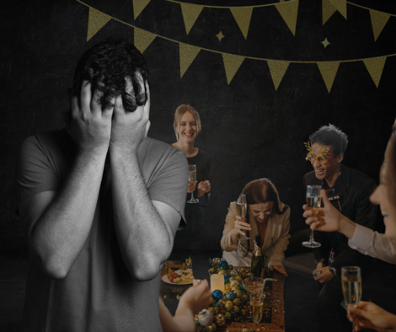Depression over the Holidays – Have you ever heard about the holiday blues?
For sure, the holiday season intends to be a time of happiness and rejoicing. But even when this could seem joyful for anybody, it may not feel like it is for some people.
For some people, holidays can be a time of painful reflection, sadness, loneliness, struggle, anxiety, and depression.
Depression during the holidays is a thing that can happen.
There are cases where some people experience a Major Depressive Disorder (MDD), outcoming with a seasonal pattern. Some people know this kind of depressive matter as Seasonal Affective Disorder.
Generally, the holiday season is, without a doubt, a hectic time of year.
There is always something going on that will need people to attend.
According to the National Alliance on Mental Illness (NAMI), roughly 24% of people with a diagnosed mental illness find that the holidays make their condition “a lot” worse and 40% “somewhat worse”.
Rates of depression, anxiety, and stress, can rise in more significant ways over the holiday season months.
Well, the holiday season is, indeed, stressful.
The activities make people busier by balancing daily work and personal obligations, which can lead to more stress.
Financially speaking, it can be a more stressful time also.
So then, What is the Holiday Blues?
The Term “Holiday Blues” originates in the melancholic music of black American Folk, typically in a Twelve-Bar Sequence.
It developed in the Rural Southern US Towards the End of the 19th Century, finding a Wider Audience in the 1940s. This Urban Blues gave rise to Rhythm, Blues, and Rock and Roll.

The “holiday blues” is an emotional state where feelings of sadness occur during the holiday season.
One thing is that depression can occur at any time of the year; still, the stress and anxiety during the holidays, such as November and December, may cause a struggling experience even for those who are usually content to experience loneliness and a lack of fulfillment.
The typical sources that trigger holiday sadness are:
– Stress and also financial stress
– Fatigue
– Putting pressure on yourself. If you’re organizing or hosting a holiday gathering, you’re probably putting a lot of pressure on yourself.
– Unrealistic expectations
– Seasonal depression. The holidays coincide with the onset of winter. As a result, seasonal depression and seasonal affective disorder (SAD) rise simultaneously.
– Not being able to be among one’s family and Friends
Is there a way of getting out of this state?
You can always receive help if you need it.
The holiday blues are usually short-term; you may find comfort by talking with a mental health professional.
Though, it is different for every person; if, after a while, you still aren’t looking forward to upcoming events or you continue to remember the holidays with sadness, it’s time to talk to a mental health professional.
If you don’t acknowledge what is happening and take action on time, this can develop into a mental health disorder after the holidays have passed.
Therapy can also help with better stress management, communication, and relationship skills that can be helpful for the short-term and even the long-term.
Here are some ways for you to stave off the holiday blues:
– Instead of spending these following holidays at home, like you usually do, try doing something different, maybe planning a family outing or vacation.
– Holiday Pressures could surround you. If they do, find a state of relaxation, even if that means leaving an event. Don’t be afraid of sharing with others how you feel.
– Try finding a moment of peace with nature. For example, take a walk and surround yourself with calm and comfortable spaces.
– Whether you’re estranged from your family or don’t have much family, you still don’t have to be alone during the holidays.
– Seek professional help if you need it.
You can contact us if you feel like there’s no way out.
Long Island Neurocare Therapy is part of Neurocare Centers of America; we specialize in Transcranial Magnetic Stimulation (TMS) Therapy for depression treatment and Neurofeedback for treating ADHD and sleep disorders like insomnia. These advanced technologies are safe, highly effective, non-invasive, and 100% drug-free.
At Long Island NeuroCare Therapy, your health and well-being are essential to our success. Contact us. We are here for you.